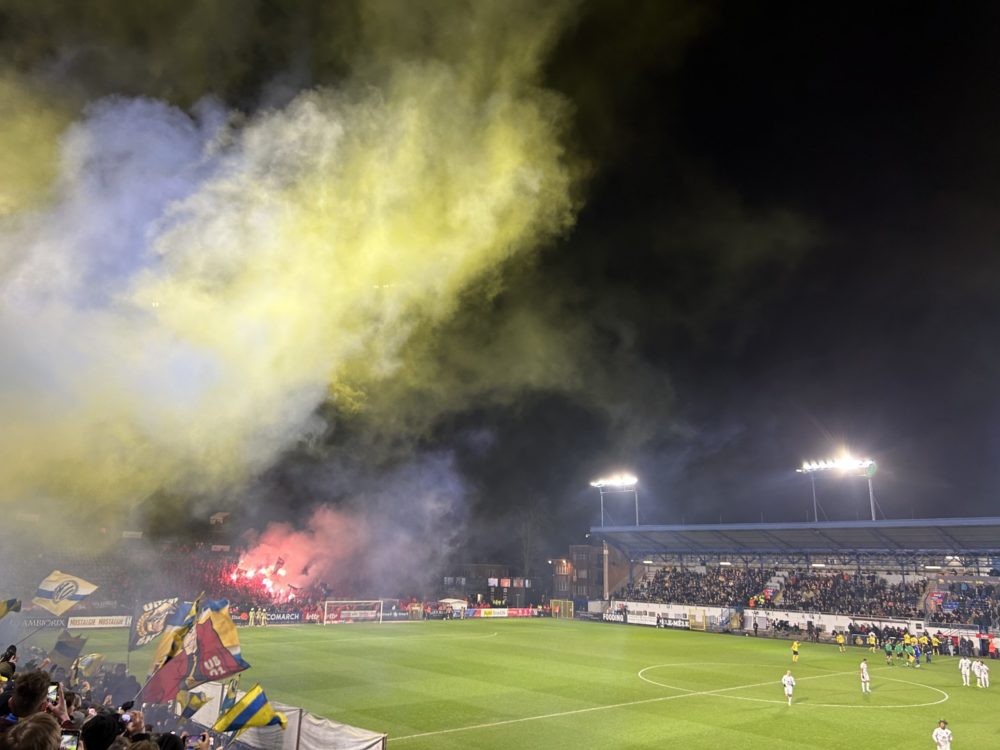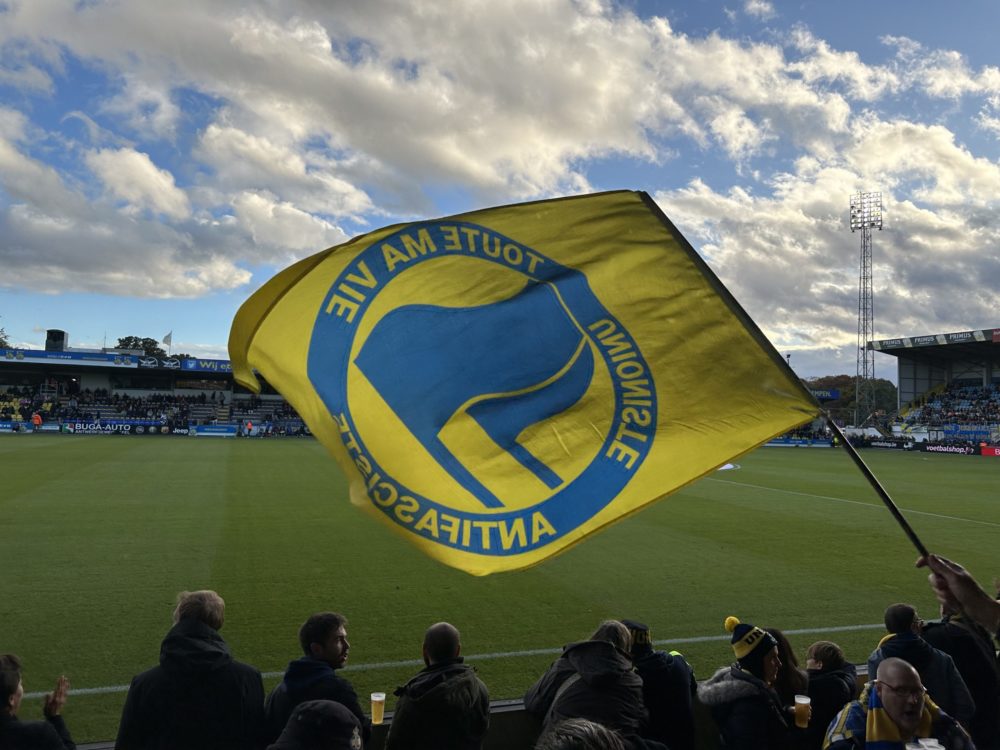The forgotten story of the revolutionary Welsh manager and ‘eternal marvel’ of Belgian football

Luke James, Brussels
Unbeaten in the league since last September, Union Saint Gilloise will begin the crucial final phase of the Belgian football season on Monday as one of the most successful teams in Europe.
Their run of 24 games without defeat has been matched only by Germany’s Bayer Leverkusen and PSV Eindhoven of the Netherlands in Europe’s top leagues this season.
That has come alongside a European run which saw them beat Liverpool and qualification for next month’s Belgian cup final.
It puts Union in pole position to claim a first league title since 1935 – when the ‘eternal marvel’ of Belgian football was managed by a certain Charles JW Griffiths.
Journeyman
Griffiths, who was born in Oswestry to a Welsh father and an English mother in 1878, was a journeyman footballer in the lower leagues who, according to most sources, made just one professional appearance.
That didn’t stop one Belgian newspaper, L’Avenir, reporting that he had been selected to play for Wales 34 times.
The team behind the Welsh Football Data Archive could find no record of him having played for Wales.
They also pointed out that, at a time when Wales played only three internationals a year, that number of caps would have made him a legend of the era.
We can only speculate that this curious claim might tell us where his loyalties lay.
Ban
One of the few mentions that Griffiths got in the media during his playing days was for a ban he received in 1899 for “taking part in a six-a-side and other illegal competitions.”
A prelude to the innovative approach he would later bring to management. And when it comes to management, Griffiths’ credentials are beyond reproach.
After finishing his playing career with Wrexham in 1909, Griffiths joined a wave of former players who crossed the Channel to help raise the standard of the game on the continent.
He enjoyed immediate success as assistant manager at Karlsruher FV, whose German championship victory persuaded Bayern Munich to make him their first ever full-time coach.
Griffiths also managed the Stuttgarter Kickers – a former club of USG’s current manager Alexander Blessin – before the outbreak of the First World War forced him to leave Germany.

The war also disrupted the rapid progress made by Saint Gilloise. Formed in 1897 by a group of teenagers playing in kit donated by another club, Union went on to win seven league titles in its first 16 seasons.
When football resumed in 1919, the club moved to a new stadium large enough to accommodate the growing number of supporters attracted by its pre-war success.
But life at Park Duden, where the club still plays home matches, began with the frustration of three consecutive second place finishes.
It was then that the Belgians looked abroad for new leadership and found, through a newspaper advert, Charles Griffiths.
Griffiths had a reputation for employing “revolutionary” coaching methods.
Physical preparation
The Oswestry native was an early advocate of physical preparation. “Every training session is preceded by a lesson in physical education [and] a complete massage service is available to the players,” reported Velo Sport in 1923.
Explaining the importance of his methods to a French football magazine, Griffiths said: “Above everything else, anyone who wants to play football must be in sufficient physical condition to keep going during 90 minutes.”
“We often see players who, during half an hour, appear brilliant on the field of play but who then can’t keep up with their opponents. They are responsible for defeat.”
A perfect match then for the Brussels club, whose supporters sing: “Les Saint-Gillois ne lâchent rien” – Saint Gilloise does not give up.
But Griffiths wasn’t just a drill sergeant. He was described as a “tactician of the first order” by the Grand Echo newspaper in France, where he managed Olympic Lillois and the national team at the 1924 Olympic games in Paris.
He spoke in detail about tactics when asked to give his opinion on the performances of the Belgian national team by the Les Sports newspaper in 1935.
“What your players are missing is the notion of individual tactics and positional sense,” he explained.
Pay dispute
Griffiths returned the league title to Park Duden at the first attempt in 1923 before leaving at the end of the season in a dispute over pay.
The results of his philosophy were best demonstrated during his second spell in Brussels a decade later.
Griffiths “inherited a team in crisis” in June 1931, according to the club’s official history.
But, between 1933 and 1935, he guided Union through sixty unbeaten matches which resulted in three consecutive league titles.
“An achievement that will forever be engraved in golden letters in the history of the club,” USG say today, and one that UEFA still recognise as one of the ten longest unbeaten runs in European football.
Griffiths planned to take Union to a fourth title when ill health forced him to retire in February 1936. He died of a heart problem three months later aged just 57.
Belgium’s Le Soir newspaper said he was “one of the best managers we have seen.”
Folklore
The achievements of his team became the folklore which sustained Union supporters during the dark years which were to follow.
After relegation in 1973, Union would not see the top flight again for another 50 years and were seconds away from being relegated to the fourth division as recently as 2013.
These circumstances helped create another Welsh connection, with USG’s ultras establishing a fraternity with the similarly long-suffering fans of Port Talbot Town.
This historic club, which can still boast the third highest number of league titles, was restored to its rightful place among Belgian football’s elite in 2021.
Union caused a shock by finishing first in the regular season before Belgium’s typically surreal play-off system, which sees each club’s point tally halved, helped Bruges prevent a fairytale ending.
It was a similar story last season. Playing in a ‘Union 60’ branded kit to celebrate the club’s 125th anniversary, a helicopter containing the league trophy hovered above Park Duden with minutes to go in the final game. Late goals saw it disappear in the direction of Antwerp.
Union again begin this year’s play-offs, which start on Monday, with a trip to the Flemish mining town of Genk, in first place. This time it’s their Brussels rivals Anderlecht who are on their heels.
As Union look towards a future at a new stadium, some will fear the history of its first years at Park Duden looks set to repeat itself with another string of three consecutive close shaves.
But the character shown by this season’s squad during their extraordinary unbeaten run suggests they have the ‘Union 60’ spirit needed to follow in the footsteps of Charles Griffiths and his team which never gave up.
Support our Nation today
For the price of a cup of coffee a month you can help us create an independent, not-for-profit, national news service for the people of Wales, by the people of Wales.





